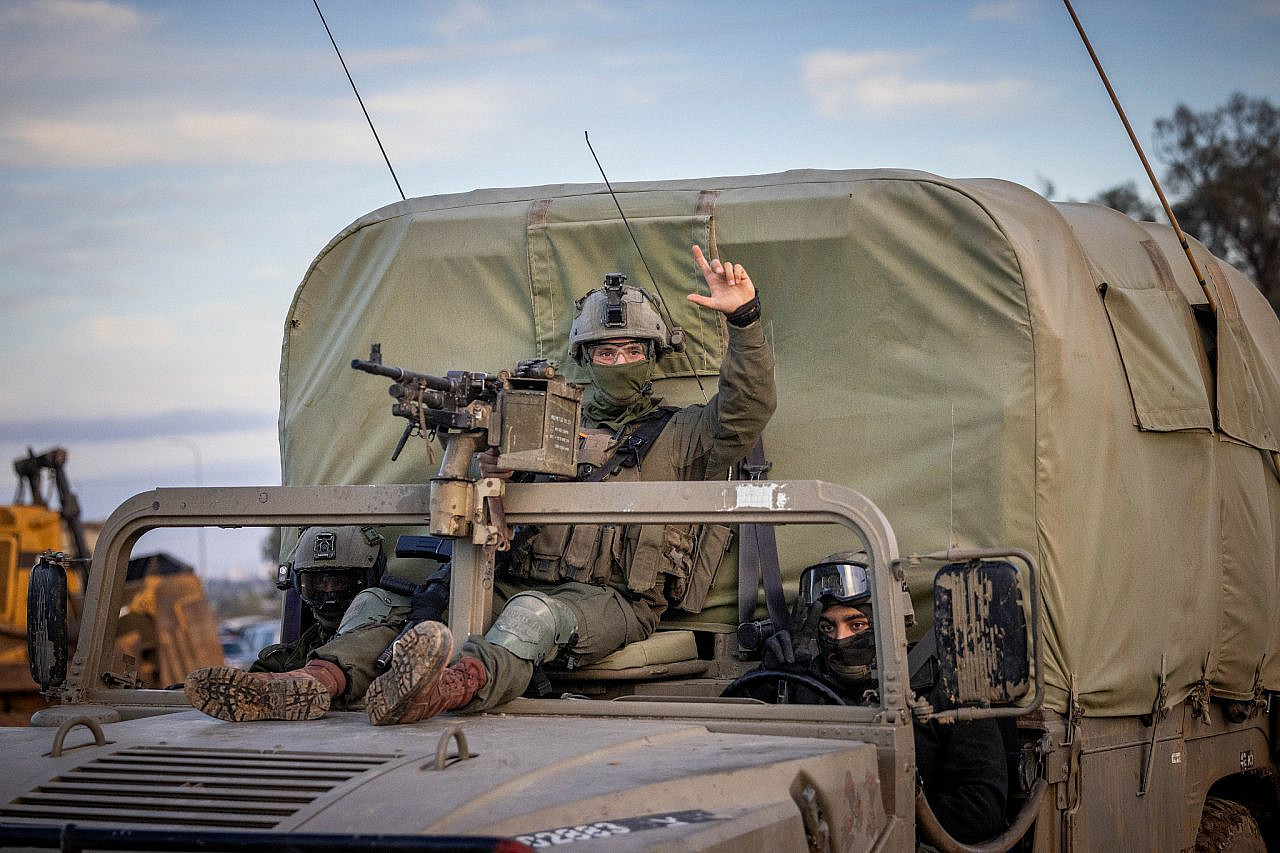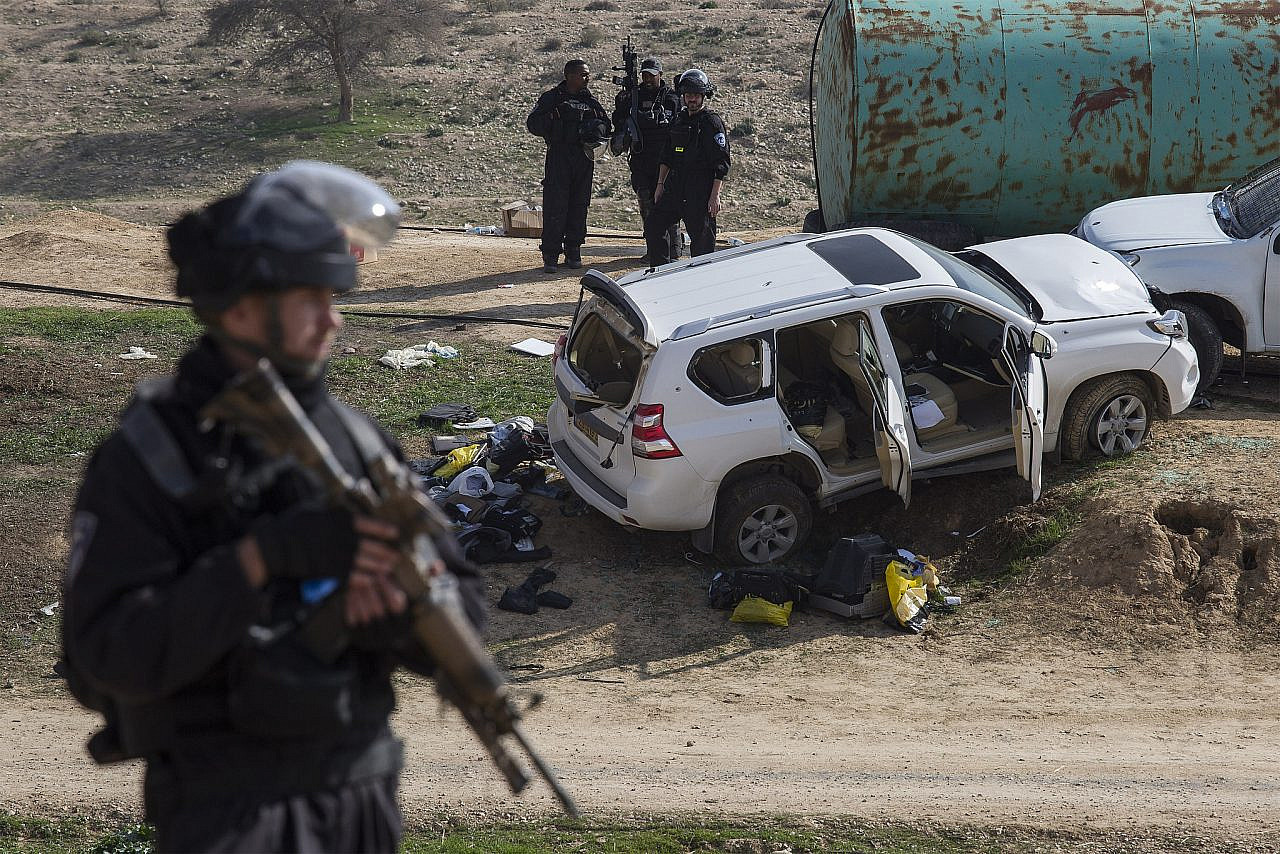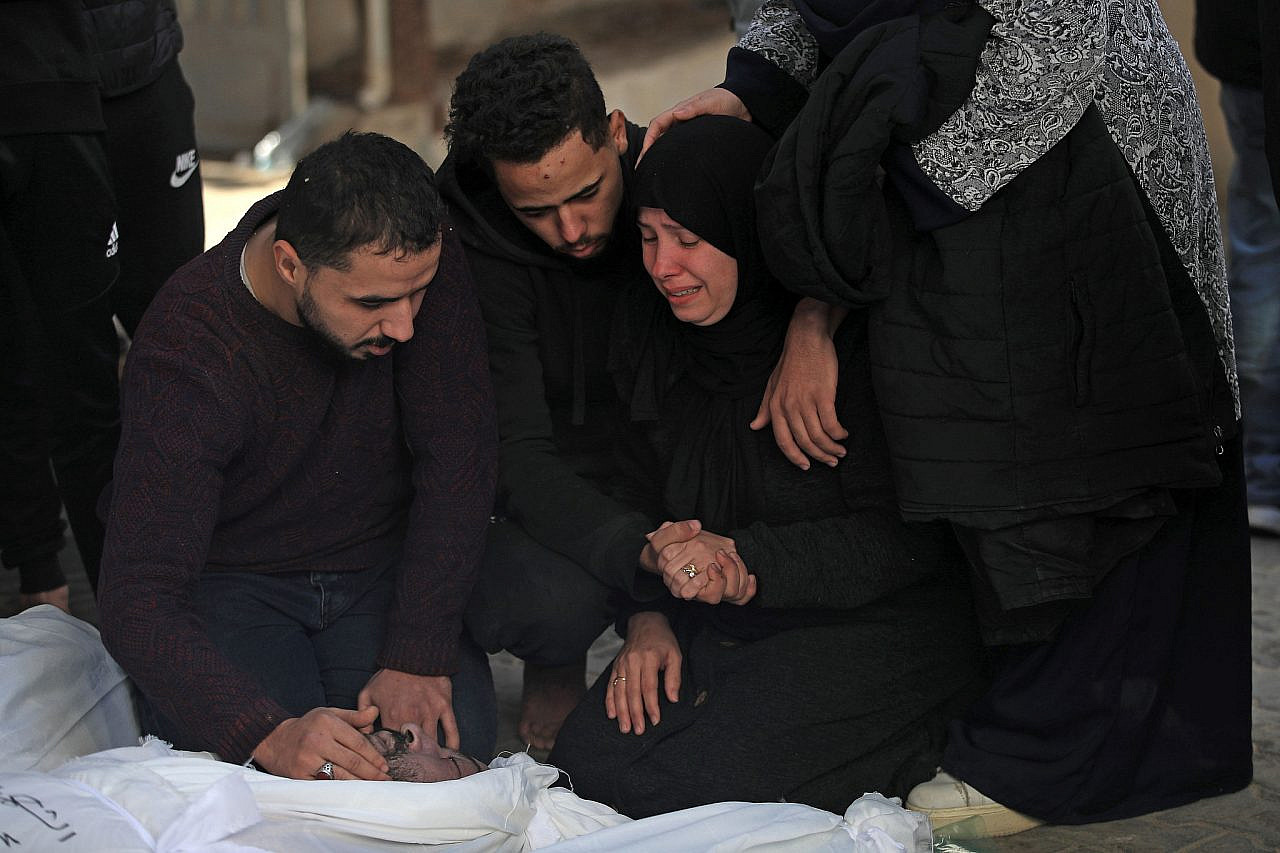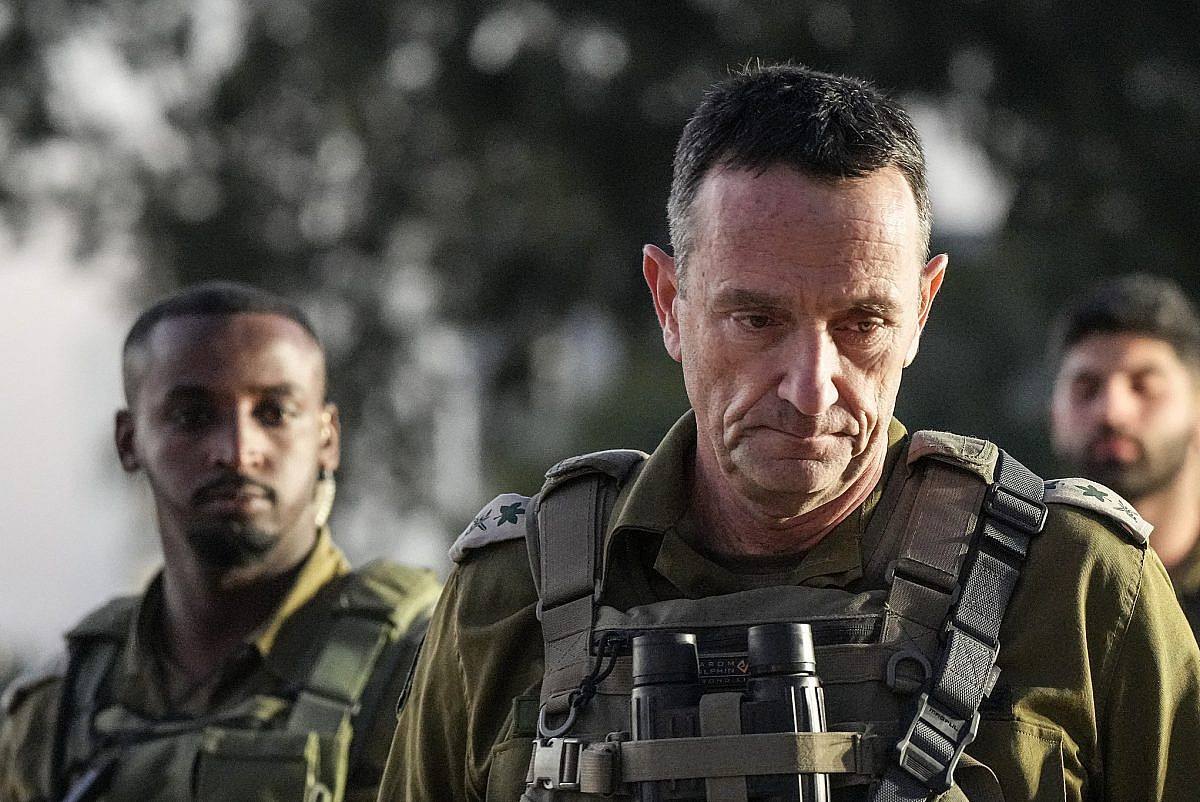On Dec. 15, Israeli soldiers in Gaza shot dead three hostages who were kidnapped during the Hamas-led October 7 attacks on southern Israel: Yotam Haim, Samer Talalka, and Alon Shamriz. A sniper first shot toward them as they emerged — shirtless and waving a white flag — from a building more than 100 yards away, killing Talalka and Shamriz. Haim managed to escape, wounded, to a building nearby, and the soldiers pursued him. After 15 minutes, they convinced Haim to exit the building, promising that nothing will happen to him. When Haim finally came toward the soldiers, one of them executed him.
The discovery that the three men were Israeli citizens, and were thus killed “mistakenly,” caused outrage in Israel. IDF Chief of Staff Herzi Halevi was quick to frame the incident as a case of soldiers not following the army’s rules of engagement: “The IDF doesn’t shoot a person who raises their hands,” he was filmed telling troops in Gaza two days later. The reality, however, is that this was a tragedy foretold, and a clear consequence of Israeli soldiers’ proclivity for shooting innocent Palestinians without facing repercussions.
The Israeli media mobilized to obscure the killing of the hostages, portraying it as an oversight that occurred because of the immense pressure of the war. Yet it wasn’t even a one-off for this war: we know of at least one other case from the past three months in which Israeli soldiers have executed people in Gaza after they surrendered, and it is possible that there have been more.
On Oct. 10, an IDF spokesperson released a video in which an officer recounts the killing of “four terrorists,” whose shirtless and lifeless bodies are seen on the ground next to him. The video goes on to show footage from before they were killed, in which the men appear to be on their knees and waving a white shirt before being shot at close range by Israeli soldiers.
Al Jazeera’s investigation into the event came to the same conclusion: the Palestinians were killed after surrendering. The officer in charge of the soldiers who carried out the executions was Lieutenant Colonel Daniel Luria — the same officer who would command the killing of the three Israeli hostages two months later.

This case, too, had forerunners. During Israel’s 2014 assault on Gaza known as “Operation Protective Edge,” Israeli soldiers shot dead 64-year-old Mohammed Qudaih in the town of Khuza’a near Khan Younis in southern Gaza. Soldiers arrived at his home — which Qudaih had opened as a shelter for neighbors who had been displaced by Israeli bombings — and knocked down the wall. Qudaih emerged wearing a tank top and holding a white flag, but soldiers killed him anyway.
The criminal investigation — which became the subject of a 2021 play in Israel, “Other Than That, Nothing Happened” — was closed without charges, similar to other investigations into the killing of Palestinian civilians during that war.
Case closed — over and over again
In recent years, I have looked into dozens of criminal investigations against Israeli soldiers and police officers who deliberately killed Palestinian civilians. Only a small fraction of such killings are followed up with an investigation, and in none of them did the shooter stand trial, despite clear evidence of fabrications in their story and the lack of any threat to their lives. Several of these cases can be read in the “License to Kill” series that I published in this magazine.
The criminal investigations I reported on were closed by the army for various reasons. Occasionally, it was determined that the civilian casualties were “worth” the military goal. This justification has been used to bomb entire families, and continues to justify the ongoing mass killings in Gaza; indeed, as a +972 and Local Call investigation published in November discovered, the army has knowingly approved the killing of hundreds of Palestinian civilians in an attempt to assassinate a single top Hamas military commander.
Whenever there was no clear military objective, or if the killing was deemed accidental and a regrettable but inevitable result of war, then the killing is deemed not to have been criminal — as when four children were killed by an airstrike because they were mistakenly identified as terrorists.
Some of these investigations reached Israel’s Supreme Court, which routinely closed the cases, albeit on various legal grounds. In 2015, for example, Lieutenant Colonel Yisrael Shomer, shot dead 17-year old Mohammed Hani Al-Kasbeh near Ramallah in the occupied West Bank, after he threw a rock at Shomer’s car and ran away. Shomer shot Al-Kasbeh multiple times in the back, claiming he “missed” when intending to shoot his leg and accidentally fired at his head. The judge, Hanan Melcer, determined that it is in the Israeli public’s interest that officers who commit such acts do not stand trial.

But was there perhaps an Israeli interest that the Court overlooked? After all, there is a clear line from shooting a person who waved a makeshift white flag in Gaza in 2014 — and the closure of the investigation because the 64-year old Qudaih allegedly posed a life-threatening danger — to the shooting of Yacoub Abu al-Qi’an in the village of Umm al-Hiran in the Negev/Naqab in 2017, whose mere existence as a Bedouin man driving his car near police officers constituted sufficient threat to warrant killing him; that investigation, too, was closed, while the state authorized the ethnic cleansing of Umm al-Hiran to establish a Jewish settlement on its ruins.
From here the line continues to the killing of Iyad al-Hallaq in 2020, whose mere being autistic and Palestinian in a sensitive security area like the Old City of Jerusalem was enough to justify killing him and leaving him to bleed out on the ground. From there, the line continues to the more recent killings of the infant Mohammed Tamimi in Nabi Saleh, whose father turned on car headlights; and Shireen Abu Akleh in Jenin, who was clearly identified as a journalist but nonetheless killed by precise sniper fire. An IDF spokesperson subsequently tried to frame journalists as a threat, asserting that they are “armed with cameras.”
From there the line continues to the killing of the Israeli man Yuval Castleman in Jerusalem last month. Castleman was shot dead by a reserve soldier — Aviad Frija, who lives in a violent West Bank settler outpost — while he was on his knees with his hands up in the aftermath of a shooting attack; Frija assumed Castleman was the perpetrator and opened fire before bothering to check. And the line continues to the shooting of the three hostages — Yotam Haim, Alon Shamriz, and Samer Talalka — which was rightly defined by Shamriz’s father as an execution.
Deflection instead of reflection
After the killings, the Israeli army briefed military reporters to write that the soldiers were unprepared to encounter hostages in combat zones. This is an astounding claim on the part of the military, considering that if one of the main goals of the war — as repeatedly stated — is the return of the hostages, and it is known that there are 129 hostages in Gaza scattered in ad hoc prisons throughout the Strip, then soldiers must surely have been prepared for a situation in which hostages might manage to escape.
It is even more astonishing given the fact that this very situation was known to have already occurred: the former hostage Roni Krivoi revealed after his release in November that he had escaped from captivity and roamed free in Gaza for four days before being captured again.
Ultimately, however, these explanations serve merely to divert attention from the core issue: the soldiers did not adhere to the basic ethical principle of refraining from shooting at someone carrying a white flag, shirtless, unarmed, and standing several dozen meters away. This principle applies even in times of war, even when soldiers are deep in enemy territory, and even when those enemies themselves do not care much for the laws of war.

In the military prosecutor’s offices, there are dozens of clear-cut murder cases, some at least as egregious as that of the hostages. Innocent children and youth are shot dead with no recourse; lies and forgeries proliferate on documents tracking weapon possession; and of course, the claim “I felt life-threatening danger” is a panacea for every purported “accident.” The case of the killing of 12-year-old Mohammed al-Alami in Beit Ummar in July 2021 has been sitting in the military prosecutor’s office for two years, but they refuse to make a decision on whether to proceed with it.
In an attempt to shorten Aviad Frija’s detention for killing Yuval Castleman in Jerusalem last month, his lawyer has claimed selective punishment against his client. He mentioned the unpunished killings of the hostages, and a similar case in Nablus, as if to argue that such killings happen all the time and need not result in prison time. He has a point: such killings do happen frequently, and they rarely, if ever, are legally redressed.
The trial of two soldiers for shooting the unarmed teenager Samir Awad in the back of the neck in the West Bank in 2013, for example, was annulled when their lawyers requested information about selective enforcement. The same argument was made by the lawyers for the police officer who shot Iyad al-Hallaq, and his ultimate acquittal was the result of his far-fetched claim that his life was in danger.
Most read on +972
The Israeli army’s ethical failures did not begin on October 7, and given its track record, its shooting of the hostages should come as no surprise. As long as the soldiers believed the men were Palestinian, there was probably nothing they could have done to avoid being shot, even though they posed no threat to the lives of the soldiers.
At this point, there is little use in discussing why the attitude toward innocent Palestinians must change when the public atmosphere in Israel dictates that there are no civilians in Gaza, and soldiers are filmed singing, “I am coming to conquer Gaza … our slogan is known, there are no innocents.” An officer in the Israeli army even declared that he entered Gaza to carry out the biblical “Simeon and Levi” mission — meaning ethnic cleansing and mass slaughter — in front of dozens of religious soldiers, and no one said a word to the contrary.
But perhaps this foretold tragedy can explain to Israelis that the systematic killing of innocent Palestinians and the subsequent tactics of denial, cover-up, and stalling come at a price for Israelis too. And that this price, once in a while, is the lives of three hostages waving a white flag.




